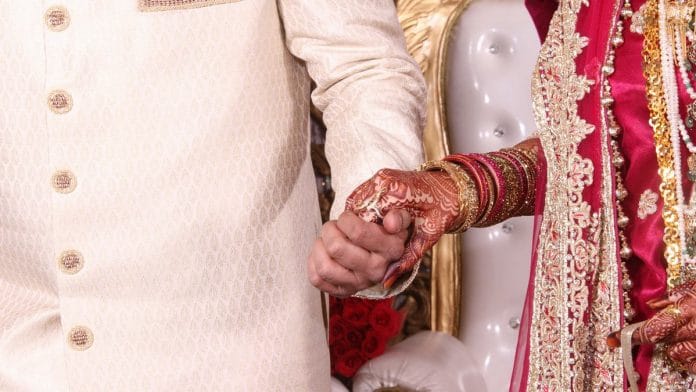New Delhi: The Himachal Pradesh High Court invoked the Bhagavad Gita to denounce opposition to inter-caste marriages, saying such resistance was the result of spiritual as well as religious ignorance.
A single-judge bench of Justice Vivek Singh Thakur also cited mythological examples of inter-caste weddings such Shantanu and Satyavati’s, and Dushyant with Shakuntala, to reiterate that the right to marry was a “well-recognised right in Indian society”.
Caste-based discrimination is not only a violation of constitutional mandate, but also contrary to the principles of the Vedas that propound equality and betterment of all, the judge added.
The court’s order came on a petition filed by Sanjeev Kumar, who sought production of his partner, who, he alleged, was in the illegal detention of her parents. Kumar claimed that his partner’s family was against their relationship and marriage since the two belonged to different castes. While the girl is a Rajput, Kumar belongs to a lower caste.
Noting that the woman’s family forcibly kept her in their custody, the bench ordered her release to live with a person of her choice, while observing that parents cannot violate constitutional mandate and law while controlling their child once he or she turns an adult.
The court also reiterated an adult woman’s right to live independently, holding she is “not a cattle or a non-living thing” but a “living soul having rights, like others”.
In India, the judge said, a woman has always been considered not only equal but on higher pedestal than male since the Vedic era, except “for evils of medieval period” and “unlike the ancient western thought wherein female was supposed to be created by God from rib of a man for enjoyment of a man”.
Also read: Courts took a break from being conservative this week. MJ Akbar, FB sedition cases show
‘Control of an adult by parents can’t be in violation of law’
Parents’ worry for the future and well-being of their children may not be ill-founded, but at the same time they, relatives and friends cannot force an adult to act according to their whims and wishes, the judge said.
An adult living in the custody of his or her parents may not be an illegal detention in normal circumstances. However, such a stay can be used to control a child to a limited extent, and that too when the child is an adult, having the right of freedom to take decisions with respect to his or her own life.
“The moment control or custody of a parent crosses the limits, in violation of constitutional mandate and law, the same becomes illegal detention or unlawful restraint, as such control is not unbridled,” the court said.
Balance is to be maintained between individuals, family and societal interests and that should be in consonance with the constitutional mandate, the court added.
‘Caste-discrimination is antithesis of basic religious principles’
According to the court, opposition to inter-caste marriages is the result of spiritual and religious ignorance “leading to behaviour in violation of constitutional mandate”.
The Constitution is an embodiment of ancient values of the “Bharatiya society”, the judge continued, adding, “independence of thought to an individual is a fundamental feature of Indian culture”.
As the Vedas propound a principle of equality and betterment of all without any discrimination by pronouncing that we should work together, eat together, march together and live together for betterment and progress of all, discrimination on the basis of caste, under the garb of religion, is antithesis of basic spiritual and religious principles, the judge said.
“Therefore, discrimination on the basis of caste is not only in violation of constitutional mandate but also in opposition to real dharma,” the court said.
The judge referred to the marriage of ‘Shiva and Sati’, which was solemnised against the wishes of Sati’s father, King Daksha Prajapati, to highlight how the right to marry is a well-recognised right in India since the ancient times.
Suppression or oppression of freedom of an individual, which is contrary not only to his or her spiritual and religious rights but also constitutional rights, is to be deprecated, he added.
Also read: Modi govt took nearly a year to clear 24 names for HC judge appointments in 4 states







Journalists from “THE CHHAPPAI” are obsessed with HINDU caste. Where both RSS and other HINDU organisations are trying to bring HINDUS together and stop divisions which unfortunately exists but are reducing.
However there seems to be a unwritten warning to “THE CHHAPPAI” journalists not to talk about different sect and division amongst Muslims and Christians.
Obiviously “GUPTAJI ” instructions are being followed to the “T”.
Absolutely right.
The problem is not the “what” (marriage). Unfortunately the problem lies in how and why of it and not in the act per se!
Casta has nothing to do with India. Casta was a racial classification of Spain and Portuguese Christians. It seperated groups based on European Christian blood in the New World.